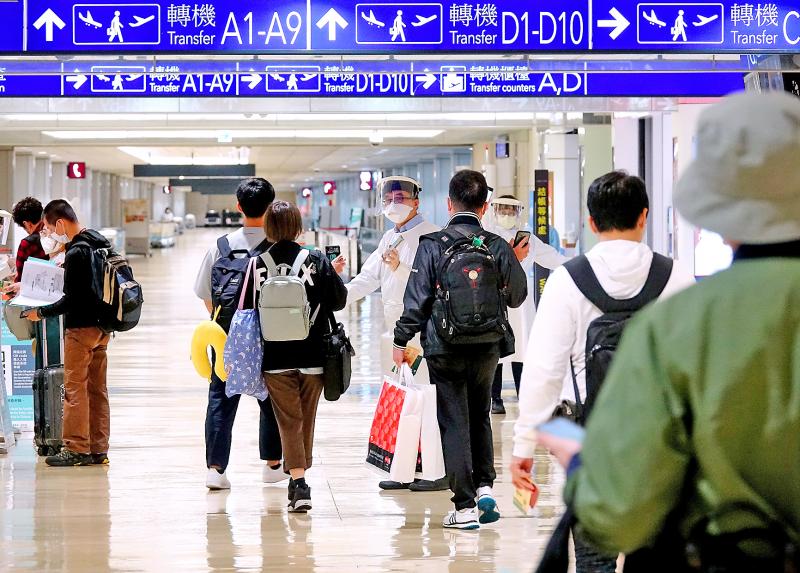Taiwan’s first cases of the new Omicron subvariants BA.4 and BA.5 of SARS-CoV-2 have been detected in five people arriving from overseas, the Central Epidemic Command Center (CECC) said yesterday.
Centers for Disease Control Deputy Director-General Philip Lo (羅一鈞), who is deputy head of the CECC’s medical response division, said genome sequencing conducted on virus samples from 57 imported cases last week showed that four people were infected with the BA.5 subvariant, one with the BA.4 subvariant and the rest with the BA.2 subvariant.
While the new subvariants account for a small proportion of total imported cases, they have not been found in local cases, he added.

Photo: Chu Pei-hsiung, Taipei Times
The four cases of the BA.5 subvariant were found in people who arrived from the US, Turkey and Poland, while the BA.4 subvariant was found in a traveler who arrived from Chile, Lo said.
The people with BA.5 infections are asymptomatic or have mild COVID-19 symptoms, with one reporting a sore throat and another an abnormal sense of taste, he said.
Health authorities in South Africa first detected the BA.4 and BA.5 subvariants in January and February respectively, Lo said, adding that they triggered a new wave of COVID-19 infections in that country in April and May.
Studies have shown that the two subvariants are more easily transmitted than previous Omicron subvariants and have a degree of “immune escape” — the ability to evade immune protection in the body induced by previous infection or vaccination, he said.
WHO data released on Wednesday last week showed that the BA.4 and BA.5 subvariants have been reported in more than 40 countries, he said.
“Based on current studies, there is no indication that the Omicron BA.4 and BA.5 subvariants cause a higher risk of severe cases, but they are more contagious and capable of escaping immune protection,” he said, adding that the center is closely monitoring any changes in COVID-19 detected in imported cases, while increasing vaccination rates.
The risk of being reinfected with the same strain of SARS-CoV-2 is relatively low, but not impossible, Lo said, adding that if the BA.4 and BA.5 subvariants become the primary circulating viruses in the local community, the risk of reinfection could rise.
Experts agree that a person’s immune protection from a previous COVID-19 infection can last about three months, but a few people might still contract the disease again, he said.
Asked whether “herd immunity” would be effective against the BA.4 and BA.5 subvariants, Lo said that the local outbreak is mainly caused by the BA.2 subvariant, with antibodies protecting against the BA.1 and BA.2 subvariants for at least three to four months.
Over the weekend, he said the BA.1 subvariant has not been recorded locally since April 21.

INVESTIGATION: The case is the latest instance of a DPP figure being implicated in an espionage network accused of allegedly leaking information to Chinese intelligence Democratic Progressive Party (DPP) member Ho Jen-chieh (何仁傑) was detained and held incommunicado yesterday on suspicion of spying for China during his tenure as assistant to then-minister of foreign affairs Joseph Wu (吳釗燮). The Taipei District Prosecutors’ Office said Ho was implicated during its investigation into alleged spying activities by former Presidential Office consultant Wu Shang-yu (吳尚雨). Prosecutors said there is reason to believe Ho breached the National Security Act (國家安全法) by leaking classified Ministry of Foreign Affairs information to Chinese intelligence. Following interrogation, prosecutors petitioned the Taipei District Court to detain Ho, citing concerns over potential collusion or tampering of evidence. The

Seventy percent of middle and elementary schools now conduct English classes entirely in English, the Ministry of Education said, as it encourages schools nationwide to adopt this practice Minister of Education (MOE) Cheng Ying-yao (鄭英耀) is scheduled to present a report on the government’s bilingual education policy to the Legislative Yuan’s Education and Culture Committee today. The report would outline strategies aimed at expanding access to education, reducing regional disparities and improving talent cultivation. Implementation of bilingual education policies has varied across local governments, occasionally drawing public criticism. For example, some schools have required teachers of non-English subjects to pass English proficiency

‘FORM OF PROTEST’: The German Institute Taipei said it was ‘shocked’ to see Nazi symbolism used in connection with political aims as it condemned the incident Sung Chien-liang (宋建樑), who led efforts to recall Democratic Progressive Party (DPP) Legislator Lee Kun-cheng (李坤城), was released on bail of NT$80,000 yesterday amid an outcry over a Nazi armband he wore to questioning the night before. Sung arrived at the New Taipei City District Prosecutors’ Office for questioning in a recall petition forgery case on Tuesday night wearing a red armband bearing a swastika, carrying a copy of Adolf Hitler’s Mein Kampf and giving a Nazi salute. Sung left the building at 1:15am without the armband and apparently covering the book with a coat. This is a serious international scandal and Chinese

NEGOTIATIONS: The US response to the countermeasures and plans Taiwan presented has been positive, including boosting procurement and investment, the president said Taiwan is included in the first group for trade negotiations with the US, President William Lai (賴清德) said yesterday, as he seeks to shield Taiwanese exporters from a 32 percent tariff. In Washington, US Trade Representative Jamieson Greer said in an interview on Fox News on Thursday that he would speak to his Taiwanese and Israeli counterparts yesterday about tariffs after holding a long discussion with the Vietnamese earlier. US President Donald Trump on Wednesday postponed punishing levies on multiple trade partners, including Taiwan, for three months after trillions of US dollars were wiped off global markets. He has maintained a 10 percent